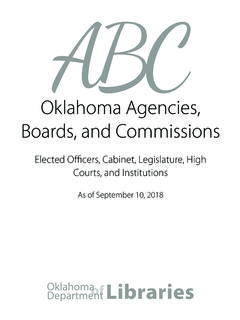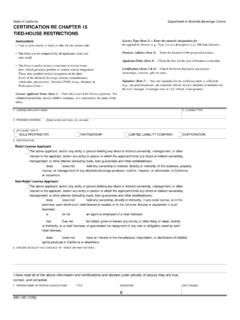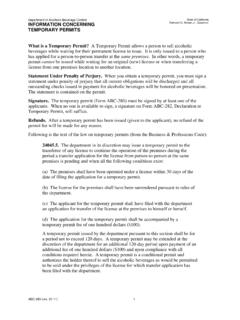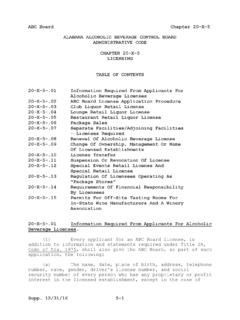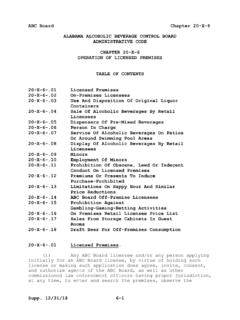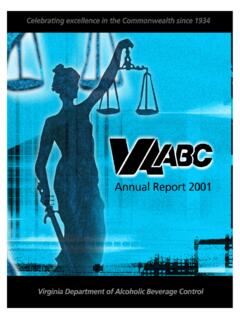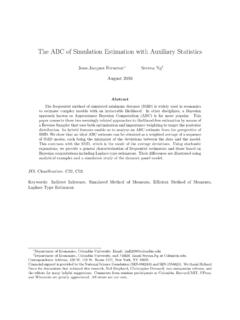Transcription of IN - Trace Lead
1 California ABC (3/15) Index IINNDDEEXX SUBJECT PAGE COMMUNITY RELATIONSRole of the Licensed Establishment .. 1 Role of State and Local Law Enforcement .. 2 ABC 3 LAWS AND LIABILITY Introduction .. 5 Types of Liability .. 6 Reducing Risk of Liability .. 7 Pertinent Laws Related to 8 CHECKING IDENTIFICATION Basics .. 9 The System for Checking .. 10 Good Policies .. 12 Identifying Minors (and How They May Fool You) .. 12 ALCOHOL FACTS Drink Equivalencies .. 13 Alcohol s Path Through the Body .. 13 Blood Alcohol Concentration .. 14 Alcohol s Effects on the Body .. 15 Factors Affecting Intoxication .. 15 INTOXICATION Identifying Problem Drinkers .. 17 Signs of Intoxication .. 17 Service to an Obviously Intoxicated Person.
2 18 Driving Under the Influence (DUI) .. 19 Managing Customer 20 ILLICIT DRUGS The Law and Illicit Drugs .. 22 Drug Recognition .. 23 Drug Paraphernalia .. 25 Signs of Illicit Drug Activity .. 27 Preventing Illicit Drug Activity .. 28 OTHER LAWS Retail 29 California ABC (3/15) Community Relations, 1 CCOOMMMMUUNNIITTYY RREELLAATTIIOONNSS RROOLLEE OOFF TTHHEE LLIICCEENNSSEEDD EESSTTAABBLLIISSHHMMEENNTT As an alcohol server/seller, you provide your community and your customers with a very important service. By serving responsibly and refusing service when needed, you can prevent the injuries and death linked to impaired driving and underage drinking. As an owner of a business, you can set the tone and create the environment for responsible drinking.
3 There are more than 80,000 licensed outlets in California. About 75,000 are on-sale and off-sale retail outlets. These businesses provide many important services for their communities. Nature of Neighborhood Concerns People are interested in safe communities. Loitering, noise, drinking, drug sales and use and other crimes can be easily seen in and around some businesses. These activities adversely affect the quality of life in the area. Inside the store, sales to minors, obviously intoxicated persons and the sale of drug paraphernalia and harmful matter video tapes are perceived as adding to overall community distress. It is critical that you understand how your business may be perceived by the surrounding community.
4 This understanding can lead to bona fide changes in at least some of these high-risk business practices. What is Community Action? A community group may be an informal gathering of neighborhood residents, a more organized neighborhood association, or a formal coalition that includes representatives from neighborhoods, schools, workplaces, government, religious, recreational, media, civic or other organizations. Sometimes, business owners decide it is not important to work with the community. When this happens, community members may take action against the merchant to resolve the perceived outlet-related problems. This action may include: Documenting illegal acts in and around licensed outlets Working with the media Working with other community-based groups Filing complaints with local law enforcement Filing complaints with ABC Picketing and boycotting Advocating laws, policies and practices to reduce alcohol availability and consumption Filing a civil lawsuit Working together with retailers on responsible hospitality issues2, Community Relations California ABC (3/15) Ideas for Relationship Building If you expect to do business in a community and be successful, you must get to know the people and the organizations that live and work in your area.
5 Join community groups and volunteer for community activities. Sponsor softball teams, little league and soccer teams. Attend city council meetings and read your local newspapers. The more you know, and are known by your community, the more likely you are to be a successful part of it. RROOLLEE OOFF SSTTAATTEE AANNDD LLOOCCAALL LLAAWW EENNFFOORRCCEEMMEENNTT The authority to regulate and control the supply of alcohol and drugs rests clearly in the arms of the law enforcement and regulatory agencies. Law enforcement agencies enforce laws regarding their manufacture, import, sale, possession and use. Alcohol-related laws are enforced by State and local law enforcement agencies. The Department of alcoholic beverage control (ABC) licenses businesses to sell alcohol and shares responsibility with local law enforcement agencies to enforce the laws of the state.
6 Department of alcoholic beverage control ABC has two core functions, licensing and enforcement. Licensing. ABC investigates applications for alcoholic beverage licenses of about 65 different types. The investigation focuses on an applicant s moral character, financial interests and the suitability of the proposed premises. Conditions are special restrictions placed on a license. Conditions may limit the hours of alcohol sales, type of entertainment allowed or other aspects of the business. If a license is conditioned, it will say so on the license. A copy of any conditions must be kept on your premises and produced at the request of any peace officer. Enforcement. The other function of ABC is enforcement. Investigators are sworn peace officers empowered to enforce laws relating to alcoholic beverages and are further authorized to enforce any penal provision of law any place in the state.
7 Local Law Enforcement The law requires local law enforcement officers to enforce alcohol laws and other laws at licensed outlets. Also, officers must send to ABC all reports of arrests and calls for service at a licensed outlet. ABC then investigates to see if grounds exist to suspend or revoke a license. ABC expects you to cooperate with the local law enforcement by calling them when you have a serious problem. However, too many calls for service are grounds for suspension or revocation of the license. Licensees who make constant calls for service, need to look closely at their business operation and make changes. Changes could include hiring more employees, closing sooner, hiring California ABC (3/15) Community Relations, 3 security guards, changing the type of music or increasing lighting.
8 ABC s Model House and Store Policies brochure gives you ideas for responsible business practices. Upon your request, your local ABC District Office can also provide assistance. Peace Officer Authority Police officers, sheriff s deputies and ABC investigators are sworn law enforcement officers (peace officers) with powers of arrest. Whether in plainclothes or uniform, peace officers have the legal right to visit and inspect any licensed premises at any time during business hours. They do not need a search warrant or probable cause. This includes inspecting the bar and the back bar, store room, office, closed or locked cabinets, safes, kitchen or any other area within the licensed premises. It is legal and reasonable for you to exclude the public from some areas of the premises.
9 However, you cannot and must not deny entry to, resist, delay, obstruct, or assault a peace officer. To do so is cause for arrest and grounds for license revocation. When conducting an inspection, a peace officer will identify himself or herself with their badge and card. The officer will ask to see the ABC license and then proceed to conduct an inspection. Don t ask to hold an officer s badge or card. Department Investigators are readily identifiable by their credentials but you cannot hold it or touch it. AABBCC PPRROOGGRRAAMMSS Minor Decoy Program The Minor Decoy Program is one way local law enforcement agencies handle complaints of sales to minors. An agency sends an underage person, acting as its agent, into a business to see if the business will sell alcohol.
10 In 1994, the California Supreme Court ruled that decoy programs are constitutional and not entrapment. Decoy programs are legal, and many agencies use them on an ongoing basis. In a decoy operation, the law enforcement agency uses a person, age 19 or younger. This person is immune from prosecution under the law. The minor decoy will try to buy alcohol at stores, bars, clubs, or other licensed outlets. If the clerk or server serves the decoy, the officer will issue that clerk or server a citation to appear in criminal court. The store owner will receive notification within 72 hours if a violation has occurred at the premises. The licensee may be subject to a suspension or revocation of the ABC license in addition to the seller s criminal proceedings.


